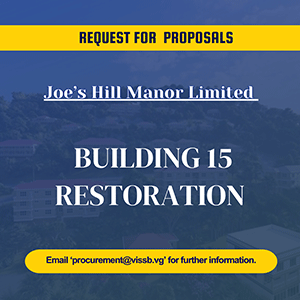Gov’t acquires new asphalt plant

Residents of the British Virgin Islands can expect quicker road repairs now that the Andrew Fahie-led government has acquired a new asphalt production plant.
Minister of Transportation & Works Kye Rymer made the announcement in the House of Assembly late last month and said there are benefits to the acquisition.
He stated: “Rebuilding the territory’s road network is of utmost to this government, and as such, a brand new environmentally friendly asphalt plant was purchased.”
Though not providing details such as the cost of the purchase, Rymer said technicians will provide coaching for the Public Works Department team, “whose job it is to operate the plant”.
No asphalt plant since the hurricanes
The government-owned asphalt plant, which is located in Fish Bay, had sustained considerable damage from the 2017 hurricanes and was no longer functional since.
But back in August last year, Rymer told BVI News that plans were underway to purchase a new plant.
At the time, Rymer had told BVI News he could not disclose the cost of the purchase because negotiations were still ongoing.
The minister did not give any indication why he neglected to announce the price of the plant when he announced the conclusion of the purchase last month.
Copyright 2026 BVI News, Media Expressions Limited. All Rights Reserved. This material may not be published, broadcast, rewritten or distributed.




















This government needs to realise that in most countries small business development promotes economic development. I am not in agreement with this move, as the government should have put systems in place to improve the standards at the current plant and perhaps regulate prices rather than killing the business of a private citizen.
First, no matter how many asphalt plants there are you first need to know how to build a road. This requires a sub base, base, tacking the base and then laying a 1 1/2” layer of asphalt. This will make the roads sustainable without the need for constant patching. Try building roads like in the first world not the third world method.
23 square miles and 2 plants? WOW! VIP killing somebody else business? WOW!
Good job VIP, hopefully a better job of paving the roads will be done in future. Whoever has been doing it since Irma has been doing a mediocre job at best.
I saw about 20 men paving a few potholes in sea cows bay today. Problem is….. it looks like only about 4 were doing any actual work.
Bananas… Few of us said the same thing. I actually count the guys between The Pub and Crandalls. It was shy from 20 guys about 6 was working, the rest were in the shade sitting down.
For the last 2 decades the BVI has been purchasing asphalt plant after asphalt plant….Way to go BVI….Keep it up!
I would hope that they’re using Mastic asphalt to pave the roads and buy proper machinery and train PWD personnel on how to use these equipments properly.
Because getting the Government involved always speeds things up.
For years i been driving on the wrong side of the road coming down “Windy Hill”
Won’t make any difference, unless they lay the proper foundations it’ll simply crumble and break away.
Hurricane Irmaria damaged the government asphalt plant at Fish Bay in September 2017. And government has been purchasing hot mix asphalt concrete from a local company ever since. What is going to happen to that company now? Did company have a contract with the government?
Ok. Private production aside, there is efficacy in government having a strong vertical integration process for asphalt production, ie, total control of the production process. And government must ensure that PWD staff is well-trained and equipped to smoothly and functionally operate and maintain the plant. The design mix must be at the proper ratio ( binder: aggregate) and at the optimum delivery temperature.
Moreover, laying asphalt over a poorly prepared road base is poor form and is costly. The subgrade must be properly stabilized, base must be of the appropriate cross section and effectively compacted, proper drainage, and riding surface must be of the proper design mix and thickness. The reality is that pot holes will occur so there must be a proactive plan to address them. The VI road network is small enough that pot hole repair can be more than ‘throw and go.’
@Road Engineer, ‘what is throw and go’?
@@Road Engineer, simply ‘Throw and Go’ is throwing hot mix asphalt in a pot hole, drive off and let car tires do the compacting. This is in contrast to prepping(cleaning out debris) the pot hole, square cutting the perimeter around the pot hole, prime and tack coating, placing hot mix in the hole and compacting it.
Throw and go is BVI standard and practice. Prepping, saw cutting/square cutting, prime/tack coating, compacting……..etc. what a dream.
So vip expose the plant that vip govt.of past had hidden in VG next to Olde Yard Village to send a message.What are they going to do with this eyesore
It looks disgraceful.We all remember whe in that election era when it was taken from Tortola brought to VG to hide.Thing to talk u say today’s govt.is for the people
The VIP is telling us to invest and here they are competing against a local who recently invested in a state of the art plant
It’s not a new plant it’s a second hand plant from Mexico
How about stopping the trash fires on Tortola? They make me so sick!l
There are Lots of places that don’t burn trash, choose one.
So do they order a paving machine also
The way they are paving the roads are only wasting the asphalt. When it rains there will be bigger potholes. Why don’t government invest in getting expertise in paving roads and let PWD workers understudy them so that moving forward we get VFM? The job they are doing now is mediocre at best, and they know better. These officials travel all over the world and see how things are done but they don’t bring anything back. It’s just business as usual with disastrous results. It must stop.
Government has two modes of doing work, ie, a)doing the work in house or b) outsourcing the work or c)doing some of both. The BVI is a small territory with a small economy and government has the greatest demand for some services, eg, road construction, repair and maintenance. However, it is not obligated to outsource the services; it is obligated to do what is in the best interest of taxpayers.
Thus, it is risky for an entity or individual to invest in a high price, singularly dedicated piece of equipment to serve one major customer, unless there is a longterm contract with the customer. Typically, when a piece of equipment is needed in such circumstances, the equipment is leased. No doubt, the VI is a remote locale and leasing will be challenging.
Moreover, sometimes government outsourcing work is more cost effective. Nonetheless, contractors do go belly up so government must maintain a minimum level of inhouse capability. Further, outsourcing do result in cost creep and after a long duration, contractors know that government cannot ramp up quickly so contractors often times have it over a barrel. Government should avoid putting itself in this situation.
Will government still be using the contractor along with it doing paving so that more work can be done faster, if the resources are available? Nevertheless, whoever does the work taxpayers should get the same high quality and get value for money.
Does this mean the hole in the road on Ridge Road pass Rudy’s with plants growing in it will be filled?
“Asphalt, also known as bitumen (UK: /ˈbɪtjʊmɪn/, US: /bɪˈtjuːmən, baɪ-/), is a sticky, black, and highly viscous liquid or semi-solid form of petroleum. … The primary use (70%) of asphalt is in road construction, where it is used as the glue or binder mixed with aggregate particles to create asphalt concrete——Wikipedia.” Asphalt road or flexible pavement is used extensively throughout the world. What is stronger concrete or asphalt? Situational!
However, a properly operated, state-of-the-art asphalt plant whether publicly or privately owned though essential alone does not produce well designed, constructed and maintained roads. Will leave the decision as to whether government does work in-house or outsource(contract) it up to government. Nonetheless, it will take a system approach to produce well designed, constructed, maintained and operated roads. BVI roads can be better designed, constructed and maintained.
Many lane miles of road in the small network are in a deteriorated condition. The poor quality and deteriorated condition increases operating cost, increases vehicle owners’ operating cost, increases reconstruction cost, increases possibility of accidents, heightens residents frustration and dissatisfaction, alarms visitors ………..etc.
Moreover, it is time to reboot the redesign, construction, maintenance, recapitalization…………etc of the road network. Good roads are a quality of life and standard of living issue. They are used and needed for commuting, visiting family and friends, transporting people and goods, growth/development/sustainability …….etc. IMO scarcity of $$$ may not be the issue, for the VI has a Gross Domestic Product (GDP) of approx $1B and an Operating and Maintenance (O&M) budget of $414M. It requires effective strategic and tactical and operational planning. A master plan is needed.
The BVI should have some of the best design, constructed and maintained roads in the region; it has one of the highest standard of living, quality of life and per capita income ($34K) in the region. It must live up to this status. No more hand wringing on the poor condition of the road network. Time to get it done.
Can the new asphalt plant use plastic to pave the roads? Asking for a friend!